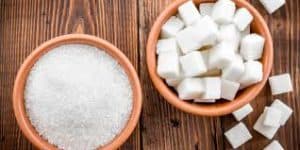 When people think of sugar they think of all the ways it sweetens up their world but what most do not know is that although sugar may be sweet, it can wreak havoc in our bodies.
When people think of sugar they think of all the ways it sweetens up their world but what most do not know is that although sugar may be sweet, it can wreak havoc in our bodies.
What Lies Beneath the Surface
With everything you consume, your organs are ultimately affected. When sugar is consumed in large amounts, your cardiovascular health can be gravely affected.
Harvard researchers completed a 15-year study comparing individuals who get 17-21 percent of their calories from added sugar with those whose diets are 8 percent sugar. Those with higher consumption of sugar have a 38 percent greater risk of dying from cardiovascular disease, says an article in JAMA Internal Medicine. They are more likely to develop fatty liver disease, which leads to diabetes. Diabetics have a higher risk of developing heart disease.
Overindulging in sugar can also place an impact on your overall kidney function. Your kidney’s role is to filter waste in your blood and when diabetes is present it damages the organs’ ability to release excess sugar into your urine.
By consuming a high amount of sugar, you increase your risk of high blood pressure, inflammation, higher cholesterol counts, resistance to insulin, and heart disease to name a few.
Behind the Sugar Coat
Obesity plays a role in large sugar intakes but what you may not be able to see on the surface is the impact sugar has on the brain. When you eat sweeter foods, your brain gets a surge of dopamine which makes you feel good and tricks you into thinking that this food is something you should consume more of.
When you consume sugary foods because you need a “fix” or an energy boost, you are only setting yourself up for a crash later on in the day, creating a vicious cycle. Those who rely heavily on sugar are more likely to develop depression and anxiety.
Choose Trick Over Treat
Not all sugar is bad for you, but even from childhood, most Americans would rather grab a candy bar than an apple (unless it’s covered in caramel). Natural sugar that’s found in fruit and vegetables is lower in sodium and higher in water than the sugar in processed foods. Not only that, they contain vitamins and minerals you need.
When sugar is added to foods, it is best to limit your intake to avoid long term damage to the body. Some foods to think about limiting are:
- Soft drinks
- Candy
- Cakes
- Cookies
- Pies
- Fruit drinks
- Dairy desserts
- Milk products (ice cream, sweetened yogurt)
When shopping for foods, always check the label to see what types of sugars are in your food. Be careful, as some sugars are listed as “syrup” or “malt” or even words ending in “-ose” may contain unneeded sugar levels.
Your glucose intake should come from whole foods and added sugars should make up for less than half of your total sugar intake. When thinking of sugar intake, your body should not consume more than 100 calories of sugar which is equivalent to about 7 teaspoons of sugar. An average soda contains about 8 teaspoons of sugar and has no nutritional value.
Pay attention to what you consume and improve your diet by avoiding processed foods. There are few who would choose pumpkin for pumpkin pie, but there are many natural sources of sugar you can substitute for a second helping of dessert. To learn more about proper nutrition and how high levels of sugar can cause more harm than good, contact our Atlanta chiropractors today at (404) 889-8828.
